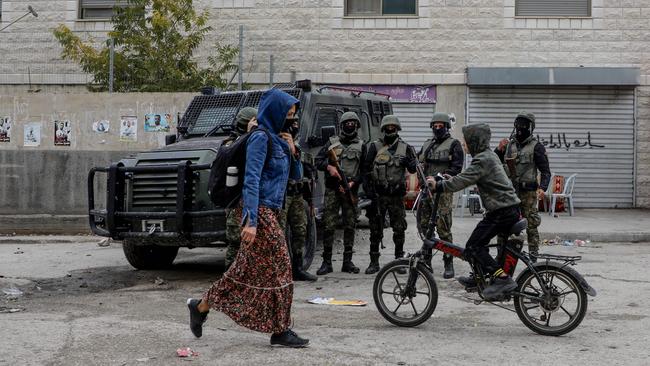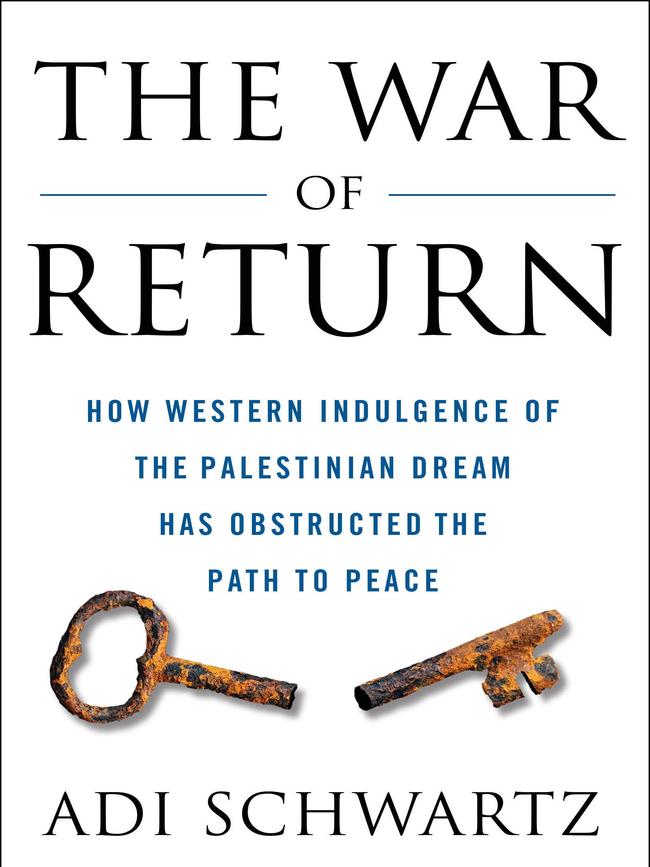The War of Return: why the path to peace is possible
The greatest obstacle to a peace settlement is not Israeli settlements on the West Bank, but the Palestinian insistence on a ‘right of return’.

‘‘How could anything new possibly be said about the Arab-Israeli conflict?’’ Adi Schwartz and Einat Wilf ask in the opening sentence of The War of Return, a compact, incisive and path-breaking book.
As it happens, there is quite a bit to be said, once one moves beyond the cliches of entrenched polemics. Like Padraig O’Malley, five years ago, in The Two-State Delusion, Schwartz and Wilf break new ground, by digging deeper and being relentlessly honest. The result is a bracing and highly constructive piece of writing.
The authors both come from the liberal Left of Israeli politics, not from the hard-line Right. Wilf was a Labour Party member of the Knesset who worked closely with Israeli leaders such as Shimon Peres and Yossi Beilin, the architect of the Oslo Accords (of which the Right has been very critical). Schwartz is a journalist who has worked for a decade at Haaretz, a left of centre Israeli newspaper. They were prompted to research and write this book out of frustration at the perennial failure of peace negotiations. “What we discovered,” they write, “actually surprised us both.”
That surprise has generated a powerful and original argument. That argument has three component parts:
The greatest obstacle to a peace settlement is not Israeli settlements on the West Bank, but the Palestinian insistence on a “right of return” of all Palestinian “refugees” to territory within the pre-1967 borders of Israel, to which in fact they do not have a right.
The United Nations Relief and Works Agency (UNRWA), created to resolve the problem of Palestinians displaced by the war of 1947-48, has instead perpetuated it.
In order actually to resolve the problem and open the way to a lasting peace, UNRWA needs to be abolished and the “right of return” unequivocally repudiated.
This will take a lot of digesting by anyone who believes that there is a right of return for Palestinian refugees to properties lost when the nascent state of Israel won the war of 1947-48; that UNRWA has been doing desperately needed relief work among genuine refugees; and that the obstacle to a peace settlement is Zionist aggression and “illegal” settlements in the West Bank. If you hold such beliefs, I urge you to read this book.
It’s precisely because it challenges these widely held ideas that the book is important and should be read closely and reasoned about, rather than dismissed as some kind of Zionist apologia. The argument the authors make is trenchant and well researched. Their writing is crisp and rigorous. Their findings are compelling – but they will certainly unsettle (as it were) anyone who thinks that Israeli concessions on the West Bank and in East Jerusalem would be both necessary and sufficient to resolve the 70- year stand-off between Israel and the Palestinians.

Wilf and Schwartz make the point, it should be noted in passing, that “the hundreds of thousands of Jewish refugees who fled or were forced out of Arab lands” as a consequence of the creation of Israel, have long since been absorbed as citizens by Israel and other countries. No-one regards them as refugees. No-one insists on their right of return. No-one demands that the Arab countries that expelled them be held to account for doing so. And, as they point out, this was true of millions of others, including 10 million Germans expelled from Eastern Europe after the Second World War. The Palestinian case is an anomaly and it needs to cease being treated as one. If it was, the “right of return” would be eliminated.
As Schwartz and Wilf emphasise, the insistence on the right of return is and always has been a means to delegitimise the state of Israel as a Jewish state. If allowed or enforced it would fatally undermine that state. The objective of the PLO/Fatah and Hamas has always been the destruction of the state of Israel and any negotiations for a two-state solution were only ever intended as an interim step to the elimination of Israel altogether. Quite simply, the right of return “cannot be reconciled with the right of the Jewish people to self-determination in their own state”. And, in every set of peace talks since 1948 – including even those of 1988 and 2008 – the Palestinians have sought to keep that “right” open; rejecting any settlement that would disavow it. This is the pivotal finding of the book.
If you’re convinced that the Jewish people do not have the right to self-determination (in Israel), then you might stand with the Palestinians and insist on their right of return. However, as the authors point out, once you do so, there cannot be a peace settlement. The two ideas are irreconcilable. Anti-Zionism is inconsistent with peace. It entails the destruction of Israel. And the obstinate demand by the Palestinians that the right of return be recognised has frustrated every attempt to arrive at a settlement. This is documented by Wilf and Schwartz meticulously. Their chapter headings show their coverage: Waging War (1948), Demanding Return (1949), Rejecting Integration (1950-1959), Wielding Terror (1960-1987), Negotiating Peace (1988-Present). No section of the book is more compelling, however, than the Conclusion. Its subsections convey the superstructure of the authors’ argument: The Path to Peace, No Right of Return, Abandoning UNRWA’s System of Refugee Registration, Dismantling UNRWA: Why and Dismantling UNRWA: How. UNRWA, they show, has long been a Palestinian-staffed and controlled NGO, which has schooled and helped to radicalise and corrupt the “refugee” culture. It is a core part of the problem. It now has to go.
What is needed is for Palestinians living outside Palestine to be absorbed (as in fact most of them already are) into their countries of domicile; for UNRWA’s work in schools and hospitals to be handed over to the Palestinian Authority; and for the Palestinian Authority to be pushed in the direction of state-building rather than guerrilla warfare. Under those conditions, a settlement of the kind offered in 2008 might finally come about. Until then, it simply won’t happen.
The War of Return: How Western Indulgence of the Palestinian Dream Has Obstructed the Path to Peace
Translated by Eylon Levy
All Points Books, 304pp, $44.99 (HB)
Paul Monk is the author of 10 books, the most recent being Dictators and Dangerous Ideas (2018)




To join the conversation, please log in. Don't have an account? Register
Join the conversation, you are commenting as Logout